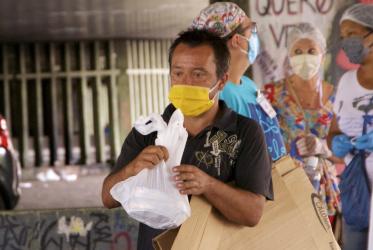Porto Alegre, 26-30 January 2005
The ecumenical family has been participating in the World Social Forum since 2003, with an increasing number of organizations and attempts to coordinate ecumenical events. The qualitative role played by churches and specialized ministries at the forum has been documented in various reports. Many more ecumenical participants attended the World Social Forum in Mumbai 2004 than the 2000 active participants in 2003 or than the dozen in Porto Alegre in 2002! A number of ecumenically-organized seminars and panels at Mumbai attracted WSF participants, allowing an exchange of knowledge, skills and networking. And yet we must ask : What is the purpose of ecumenical participation at the World Social Forum?
In May and again in July 2004, members of a prospective ecumenical coalition met and began working on the rationale for their participation in WSF 2005. Coordinated by the WCC, and attended by representatives of the World Alliance of YMCAs, the Lutheran World Federation (LWF), the World Student Christian Federation (WSCF), the Ecumenical Advocacy Alliance (EAA), CCFD/CDSE, Caritas Internationalis, the World Alliance of Reformed Churches (WARC), the World YWCA, Pax Romana, Association of World Council of Churches related Development Organisations in Europe (APRODEV), and CESE/Foro Ecumenical Brazil/PAD, the coalition considered how to organize joint and individual events. Based on awareness that WSF 2005 will mainly focus on sharing actions and alternatives, member organizations shared their previous experiences, and focussed on the topics ("terrains") identified by the WSF secretariat.
Visible and meaningful
It was agreed that the main priority of the ecumenical presence at the World Social Forum is to ensure a visible and meaningful ecumenical contribution to the WSF. Based on the desire to achieve something significant together, common planning and coordination, identifying common areas of concern, expected outcomes and methodology, and avoiding overlap, duplication and contradiction were seen as essential. The need to improve solidarity with social movements and NGOs with similar goals was also stressed. Ecumenism understood as going beyond merely church unity can bring much to the WSF, including faith and cultural perspectives on the struggle for alternatives and the building of just societies. It was agreed that rather than promoting the image of individual organizations, the goal of a visible ecumenical presence is to show the common witness of Christians in the world today - a witness which does not claim to be "better" but to be an authentic alternative voice.
Strengthening networks
Considering that the WSF offers unique opportunities for regular ecumenical encounter, the preparatory meetings asked the local committee in Brazil to explore possibilities for providing spaces where ecumenical participants might get together at the Forum to analyze how ecumenical thought is shaped by the WSF, and vice versa. The possibility of a tent for meetings and worship, and an inter-faith celebration/prayer event were discussed. Two related events - a 21-23 January World Forum on Theology and Liberation, and a youth event with the participation of some 200 young people from the WCC, the WSCF and youth organizations in Latin America - will provide opportunities for ecumenical networking before the Forum opens.
Thematic areas
The WSF Content and Methodology Commission has formulated eleven thematic "terrains" and sub-terrains to be dealt with at the forum:
1. Assuring and defending Earth and people's common goods - an alternative to commodification and transnational control.
2. Sovereign economies for and of people - against neo-liberal capitalism
3. Peace, demilitarization and struggle against war, free trade and debt
4. Autonomous thought, re-appropriation and socialization of knowledge and technologies
5. Defending diversity, plurality and identities
6. Social struggles and democratic alternatives - against neo-liberal domination
7. Ethics, cosmovisions and spiritualities - resistances and challenges for a new world.
8. Communication: counter-hegemonic practices, rights and alternatives.
9. Arts and creation: weaving and building people's resistance culture.
10. Human rights and dignity for a just and equalitarian world.
11. Towards construction of international democratic order and people's integration.
Three additional terrains defined as "transversal" are:
Social emancipation and political dimensions of struggles
Struggle against patriarchal capitalism
Struggle against racism.
The main terrains have been determined in a way that, it is hoped, will facilitate the formulation of common proposals and action. For example, the terrain "Assuring and defending Earth and people's common goods - an alternative to commodification and transnational control" should be capable of bringing together environmentalists, people fighting for the right to land, those combating the privatization of life and the human genome, and those demanding the removal of pharmaceutical industry patents in order to guarantee access to all medicines.
In this logic, Forum groups will be formed not by the actors of particular struggles, but by challenges to be surmounted, thus preventing the formation of ghettos. Participants will be encouraged to participate in multiple terrains. In this spirit, the ecumenical organizations convened in Geneva in July to identify their joint and individual themes.
Under the terrain "Human rights and dignity for a just and equalitarian world" (Terrain 10), the ecumenical coalition will organize an event on "Affirming life in dignity: enhancing life and rights in a globalized world", with presentations from a Latin American perspective; on global challenges: unilateralism of the US; the commitment with dignity and justice of religious communities.
Under the terrains "Ethics, cosmovision and spirituality - Resistance and challenges for a new world" (terrain 7), and "Peace and demilitarization - Struggle against war, free trade and debt" (terrain 3), the coalition is proposing workshops on women's spirituality of life and dignity; the dignity of children; international ethics; religious conflicts and peace; illegitimate debt; ecological debt; and "Water is life - right to water".
Rogate Mshana
WCC Programme on Economic Justice
4 January 2005
